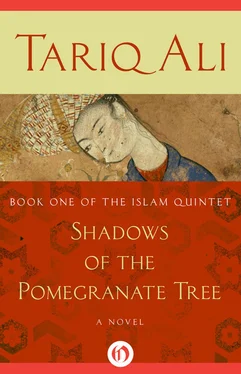As they rode the day was in full progress and the sun, unfiltered by even a single cloud, was warming the earth, whose scented dust they inhaled as they climbed the mountain. Ahead of them there lay an irredeemable landscape.
Later that afternoon, al-Zindiq delivered Zuhayr’s letter to Umar and described the events of the last two days. He was heard in silence. Even Yazid did not ask questions. When the old man had finished, Ama was weeping loudly.
‘It is the end,’ she wailed. ‘Everything is over.’
‘But Ama,’ replied Yazid, ‘Zuhayr is alive and well. They have begun a jihad. That should make you happy, not sad. Why do you cry like this?’
‘Please do not ask me, Ibn Umar. Do not torment an old woman.’
Zubayda signalled to Yazid that he should follow her and Umar out of the room. When Ama saw that she was left alone with al-Zindiq she wiped her tears and began to question him about the details of Zuhayr’s appearance that morning.
‘Was he wearing a rich blue turban with a crescent made of gold?’
Al-Zindiq nodded.
‘That is how I saw him in my dream last night.’
Al-Zindiq’s tone was very soft. ‘Dreams tell us more about ourselves, Amira.’
‘You do not understand me, you old fool,’ Ama retorted angrily. ‘In my dream Zuhayr’s head wore that turban, but the head was lying on the ground, covered in blood. There was no body.’
Al-Zindiq thought she was about to cry again, but instead her face turned grey and her breathing grew loud and irregular. He gave her some water and helped her back to her room, a tiny chamber where she had spent most of her nights for over half a century. She lay down and al-Zindiq covered her with a blanket. He thought of their past, of words left half-spoken, self-deceptions, the pain he had caused her by falling in love with Zahra. He felt that he had been the ruin of Ama’s life.
Instinctively, the old woman read his thoughts.
‘I don’t regret for a single moment the life that I have lived here.’
He smiled sadly. ‘Somewhere else you could have been your own mistress, beholden to no one but yourself.’
She stared up at him with a plea in her eyes.
‘I have wasted my life, Amira,’ he said. ‘This house has cursed me forever. I wish I had never set foot in its courtyard. That is the truth.’
Suddenly she saw him at eighteen, with thick black hair and his eyes full of laughter. The memory was enough.
‘Go now,’ she told him, ‘and let me die in peace.’
For al-Zindiq the very thought of dying quietly, passing on without a last scream of outrage, was unthinkable and he told her so.
‘It is the only way I know,’ she replied as she clutched her beads. ‘Trust in Allah.’
Ama did not die that day or the next. She lingered for a week, making her farewells at her own pace. She kissed Umar’s hand and dried Yazid’s tears, told Zubayda of her fears for the family and pleaded with her to take the children away. She remained calm except when she asked Umar to remember her to Zuhayr.
‘Who will make him his heavenly mixtures when I am gone?’ she wept.
Ama died in her sleep three days after Zuhayr’s flight from Gharnata. She was buried near Zahra in the family graveyard. Yazid grieved for her in secret. He felt that as he was approaching manhood he should be brave, and not display his emotions in public.
EVERY MORNING AFTER BREAKFAST, Yazid would take his books and retire to the tower.
‘Stay here and read with me,’ Zubayda would plead, but he would give her a sad little smile.
‘I like reading on my own. It is so peaceful in the tower.’
She never insisted, and so what had started as an assertion of the independence associated with approaching manhood had become a regular routine. It had begun two months ago when they had first heard the news of the events in Gharnata and the flight of three hundred young men with Zuhayr at their head.
Yazid had felt so proud of his brother. His friends in the village had been full of envy and he could not fully understand the sadness which had descended on the house. Even Ama, who had died so peacefully in her sleep, had expressed her misgivings.
‘Nothing good will come out of this adventure, Ibn Umar,’ she had said to Yazid, who could not have known then that these were virtually the old woman’s last words.
It was her caution which had made Yazid rethink the whole affair. It was Ama who, in the past, had defended every daring deed, however foolhardy, carried out by any male member of the family. She had filled his head with seamless stories of chivalry and courage which naturally featured his great-grandfather, Ibn Farid, in a prominent role. If Ama was worried about Zuhayr, then the prospect must be really grim.
From his tower, Yazid saw a horseman riding towards the house. Every day when he went up there he would hope and hope and pray that he would see such a sight and that it would be his brother. The rider was at the gates of the house. His heart sank. It wasn’t Zuhayr. It was never Zuhayr.
Yazid had never known the house so empty. It was not just Zuhayr’s absence or Ama’s death. These were heavy losses, but Zuhayr would return one day and, as for Ama, he would see her, as she had promised him so often, in Paradise. They would meet in the seventh heaven, by the banks of the stream which flowed with the tastiest milk imaginable. He missed Ama more than he would admit, but at least her place had been taken by al-Zindiq, who knew much more about the movement of the stars and the moon. Once when he had told al-Zindiq about his projected reunion with Ama, the old man had chuckled and said something really strange.
‘So, Amira thought she would go straight to the seventh heaven, did she? I am not so sure, Yazid bin Umar. She was not without sins you know. I think she might have problems getting past the first heaven and, who knows, they might even decide to send her in the other direction.’
No, it was Hind’s marriage and departure which, while not a surprise, had nonetheless come as a devastating blow. He was closer to Hind than to anyone else in his whole family. But she had gone. True, she had begged her parents to let Yazid go across the water with her for a short time, swearing to bring him back herself after a few months, but Zubayda would not be parted from her son.
‘He is all we now have left in this house. I will not let my most precious jewel be stolen from me. Not even by you, Hind!’
And so Hind had left without her brother. It was this, much more than the leaving of her ancestral home, that had made her weep like a child on the day of departure, and again a day later when she and Ibn Daud had boarded the vessel in Malaka for the port of Tanja.
Someone was running up the steps to the tower. Yazid abandoned his thoughts and began his descent to the house. Halfway down he encountered his mother’s maid-servant, Umayma, her face flushed with excitement.
‘Yazid bin Umar! There is a messenger here from your brother. He is with the Lady Zubayda and your father, but he will not speak until you are present.’
Yazid brushed past her and flew down the stairwell. When he reached the ground he ran through the outer courtyard like a whirlwind as Umayma, cursing under her breath, discovered that she could not keep up with him. She was no longer the slim gazelle who could outpace even al-Fahl. She had become round-wombed over the last few months.
Yazid appeared breathless in the reception room.
‘This is Yazid,’ said Umar, his face wreathed in smiles.
‘Your brother sends you hundreds of kisses,’ said Ibn Basit.
‘Where is he? Is he well? When will I see him?’
‘You will see him before long. He will come one evening, when it is already dark, and leave the next morning before it is light. There is a reward for his head.’
Читать дальше












